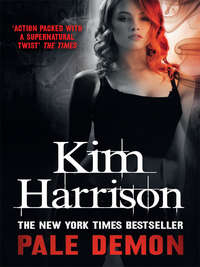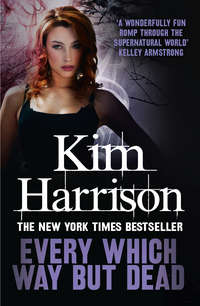
Полная версия
Ever After
Confused, I slid from the stool, shimmying until my dress fell right. If I was there, Trent wouldn’t see it as me watching his back. He’d say I was babysitting him. Quen had it wrong.
Didn’t he?
“After you,” Quen said sourly, gesturing for me to follow the man standing before us with two huge menus in his hand.
God save me from myself, maybe Quen was right. “Quen . . .”
But then my gaze jerked up to the TV over the bar as I caught a familiar phrase, and my thoughts of Trent vanished. With a sudden flash, I recognized the new Rosewood wing behind the newscaster on the scene. The Rosewood wing was simply a fancy name for the three comfortable houselike facilities they’d built for the terminally ill babies suffering from Rosewood syndrome. The cul-de-sac was damp from the earlier rain, and lights from the I.S. cruisers and news vans made everything shiny. The thought of THIRD ABDUCTION echoed through me, and I jerked to a halt. Behind me, Quen grunted in surprise.
“Turn it up!” I exclaimed, turning back to the bar and shoving past Quen to get closer.
“. . . apparently abducted by a kidnapper posing as a night nurse,” the woman was saying, and I felt myself pale. “I.S. officials are investigating, but so far they have no leads as to who is taking the failing infants, and why.”
“Turn it up!” I said again, and this time, the bartender heard me, aiming a remote and upping the volume. I felt myself pale as Quen rocked to a halt beside me, both of us looking up. A phone buzzed, and Quen jumped, his hand fumbling to a back pocket.
“Because of baby Benjamin’s miraculous progress in fighting the lethal disease, officials are not hopeful for a ransom demand—they fear that he was taken by unscrupulous biogenetic engineers trying to find and sell a cure.”
“Oh my God,” I whispered, fumbling in my clutch bag for my phone. They’d killed all the bioengineers during the Turn. It was a tradition both humans and Inderlanders alike gleefully continued to this day. That I was alive because of illegal tinkering didn’t make me feel any better.
“Let’s hope they find them soon,” the woman was saying, and then the headlines shifted to the latest Washington scandal.
Head down over my phone, I punched in Trent’s number. It would go right to his private quarters, bypassing the switchboard. I felt hot, then cold, my grip on my phone shaking. He wouldn’t have abducted the baby, but he’d have a short list of who might have. The Humans Against Paranormals Association, HAPA, maybe, now that they couldn’t have me. Trent had once promised that he’d give the demons the cure to their infertility, but after suffering through the chaos wrought by his father’s saving me, I couldn’t believe that Trent was looking to increase the number of survivors just yet.
The busy signal shocked through me, and I glanced up at the shadow of a man standing too close: Quen, his brow furrowed as he looked at his phone’s screen. Blinking, I remembered where I was. Quen’s lips twitched, and he held out his phone. It was smaller and shinier than mine. “He’s on my line,” he said with a thin, distant voice. “You talk to him.”
Fingers shaking, I took the phone. “He’ll know we’re together, that we talked.” Oh God, I didn’t want Trent to know that Quen doubted him. He looked to him as his father despite the monthly stipend.
Quen shrugged. “He’ll find out anyway.”
Mouth suddenly dry, I answered the phone and put it to my ear. “Trent?”
The hesitation was telling, but he caught his balance quickly. “Rachel?” Trent said, clearly surprised. “I’m sorry. I must have hit the wrong button. I was trying to reach Quen.”
I held the phone tighter, my pulse pounding. His voice was beautiful, and I felt glad for turning Quen down. “Ahh,” I said, glancing up at a stoic Quen. “You hit the right number.”
Again Trent hesitated. “Okay?”
“We were having dinner.” I explained nothing, and Quen’s face became even more bland. “Quen and I. You saw the news? Do you know who did it?”
My worry came rushing back, crowding out my brief flash of pleasure for having caught Trent off guard. It happened so seldom. The host was still waiting, and when Quen shook his head, he smiled ingratiatingly and walked away, dropping the menus on the bar.
“No, but I’m going out there right now.” Trent’s tone was tight, and my idea that he was fixing Rosewood babies died. “Since you’re with Quen, would you both meet me there?”
My lips parted, even as I heard the accusation in his tone. He wanted me there? With him?
“Rachel, are you there?” Trent asked, and I flushed, glancing at Quen before pushing the phone tighter to my ear.
“Yes. The hospital, right?” Where all the news vans were? Swell. I couldn’t help but wonder if his invitation was because he wanted my professional opinion or simply to find out what Quen and I were doing.
“Rosewood wing,” he said, his tone grim. “I doubt there will be any indication as to who took the infant, but I don’t want evidence to be buried if the I.S. doesn’t like what they find. If one of us is there, we will at least have the truth.”
I nodded as Quen exchanged a few words with the bartender and slipped him a bill. The I.S. was an offshoot of the original FBI and local police forces before the Turn, responsible for hiding Inderland crimes before humans could find evidence that witches, werewolves, and vampires existed. Covering up the uncomfortable or unprofitable was in their blood.
“Rachel, may I talk to Quen?” Trent asked, shaking me out of my thoughts.
“Um, sure. I’ll see you there.” My stomach was in knots, and I held the phone out. “He wants to talk to you.”
Quen looked at the phone, his expression never shifting as he reluctantly reached out. Turning sideways to me, he drew himself up. “Sa’han?” He hesitated. “Having dinner.” Another pause. “Of course Ceri knows. It was her idea.”
Ceri was in on this, too? Frowning, I forced my arms from my middle. Trent would be pissed. I knew I’d been when my mom and dad rented me a live-in personal security guy for a few months.
“No,” Quen said firmly, and then again, “No. I’ll see you there.”
I could hear Trent complaining as Quen closed the phone, cutting him off midprotest. That wasn’t going to go over very well, I decided, and when Quen gestured for me to head out before him, I meekly fell into place, my thoughts turning to the hospital.
Behind us people laughed and clinked glasses. Below, Cincinnati moved with her people, uncaring and unaware. It felt wrong now. Someone was stealing Rosewood babies. The “why” was ugly.
Quen was silent all the way to the elevator. He avoided my eyes as I handed him my ticket to give to the coat-check woman. I could have given it to her myself, but high society came with weird rules, and it was no skin off my nose. “You’re not going to tell him?” I said, hoping he wanted to use the time it would take to get to the hospital to come up with some story other than Quen’s asking me to babysit Trent.
Gaze distant in thought, Quen shook out my shawl and I turned around, my head lowered. “You might be right,” he said, and I shivered as the silk settled over my bare skin. “I may have acted without thought.”
It was an honest answer, but Quen might be right as well. Trent didn’t need a babysitter, but everyone needed someone to watch their back.
Chapter Two
Quen’s car was warm, the seats heated and my vents aimed at me, making the escaping strands of my braid tickle my neck as we slowly wove through the twisty hospital campus. Feeling ill, I leaned toward the dash and peered through the curved glass, both anxious to get there and uncertain as to what I was going to tell Trent. It was starting to mist, and everything had a surreal glow. The tall main building looked foreboding in the rain, lights gleaming on its slick walls. That was not our destination. People got better—mostly—at the hospital. Where we were headed, the only healing was emotional.
The tires hissed on the wet pavement as we took a tight corner into a cul-de-sac. Three modest structures, identical apart from their color, were before us, I.S. cruisers and black Crown Vics parked in the drives and at the curbs. My lips curled in disgust at the news vans, bright lights spilling out along with heavy wires like grotesque umbilical cords running into one of the houses. It must have made their night to have their local story picked up nationwide.
The three two-story homes looked out of place in the otherwise institutional hospital setting. They were relatively new, the landscaping bushes still small and inadequate. It was Cincinnati’s Rosewood wing where Rosewood babies were moved to, sometimes born here, but always dying here, never surviving. A lot of parents elected to take their baby home for his or her last days, but not all, and the homey atmosphere was a boon. Counselors were more prevalent than nursing staff. They hadn’t had such a place when I’d been born, and as Quen parked his two-seater into a space too small for the official cars, I felt odd and melancholy.
Quen put the car in park, making no move to get out. I, too, leaned back into the plush seat, afraid almost. Blowing his breath out noisily, Quen turned to me. “I’m going to tell him we had dinner and talked about his security,” he finally said, his eyes holding a hint of pleading. “I’m also going to tell him that I was asking your opinion if he was secure on his own merits, and that you said he was, but that if the situation changed that you would . . .”
My heart thumped as he let his words trail off into expectation, waiting for me to finish his sentence and tell him I’d watch Trent when he couldn’t. That wasn’t even mentioning the little white lie. I didn’t know how I felt about that, and I searched Quen’s expression. The shadow-light coming from the lit-up building made him look older, his worry clear. Damn it all to hell. “That if the situation changed that I’d be able to assist in keeping the girls safe,” I said firmly, and Quen’s expression became stoic.
“Very well, Tal Sa’han,” he grumbled, and my eyebrows rose. Tal Sa’han? That was a new one. I would have asked him what it meant, but his voice had been mocking.
“Then let’s go,” I said, reaching for my bag. The little clutch bag felt too small as I got out, and my clothes were totally inappropriate for a crime scene. The cool mist touched my face, and the thump of Quen’s door surprised me. Dropping my eyes to the damp pavement, I shut my door as well.
I took a deep breath and lifted my chin, starting for the door, already propped open for the sporadic flow of people in and out. I couldn’t help but notice the opening was almost twice as wide as usual. I hated oversize doors—or rather, I hated the wheelchairs they alluded to. A sudden wish to be anywhere but here struck me. I had escaped dying from Rosewood syndrome. It had taken almost all my early life to do it and it shaped me in ways I was only now figuring out, but the reminder was bittersweet.
Quen met me stride for stride. “Are you okay?”
We had gained the paved walk, which artistically meandered to give the appearance of distance and interest. It just looked fake to me. “Fine,” I said, my mood growing worse. I didn’t want to be here—didn’t like the memories being stirred up. Someone was stealing Rosewood babies, and what followed from there was enough to make my nights sleepless.
Head down, I stepped over the news van’s cords, walking sideways to get through the door and flashing my ID to the I.S. guy. I think it was more Quen’s and my fancy dress that got us in than my ID. The officer clearly didn’t recognize me, but only someone who needed to be here would come dressed in formalwear. I’d have to remember that.
The cool night mist vanished, and I hesitated just inside the wide entryway, feeling Quen’s silent, solid presence behind me. A set of stairs led up, probably to the nurses’ quarters; the kitchen was behind the stairway, down a short hallway. There were two living rooms, one to either side of the door. Both of them were full of people standing around talking, but only one had the lights of the news crews. It was warm, even for me, and I didn’t like the excited tone of the newswoman asking the distraught mother how she felt now that her baby—thriving against all odds—had been stolen.
“What a slime,” I whispered with a surge of anger, and Quen cleared his throat. Someone had pieced together that the Rosewood syndrome was actually an expression of too much demon enzyme and was “harvesting” demon blood while the babies still lived. I’d be dead, too, if Trent’s father hadn’t modified my mitochondria to supply the enzyme that blocked the lethal action of the first enzyme that actually invoked demon magic. It was a mouthful that basically meant he’d enabled me to survive being born a demon.
Quen’s hand cupped my elbow, and he gently pulled me out of someone’s way. Numb, I looked for a familiar face—somewhere to start. My evening dress was garnering odd looks, but it also kept people away. That stupid newscaster was still interviewing the parents, and I.S. agents stood at the outskirts hoping to get some airtime. No one recognized me, thank God, and I felt guilty for being surrounded by so much grief—grief that my parents had endured and triumphed over. Damn it, I would not feel guilty for having survived.
“There he is,” Quen breathed in relief, and I followed his gaze to the back of the living room to the hallway running from the nurseries to the kitchen.
“And Felix,” I said, surprised to find Trent talking to the undead vampire. Or rather, he was talking to Nina, the young vampire that Felix currently liked doing his aboveground talking through. The young woman was looking thinner than the last time I’d seen her, better dressed and confident, but decidedly peaked, as if she’d been on too many amphetamines for the last four months. It was hard to see her behind the suave, collected undead vamp controlling her body, living through her for a few hours at a time.
It was about what I had expected. Serving as an undead master’s mouthpiece wasn’t safe for either party—the old vampire was reminded too strongly of what it was like to be alive and began to pine for it, and the young was given more power running through his or her mind and body to handle alone. It was a knife’s edge that only the most experienced attempted at this level, and I was starting to think that the relationship had passed the point where it could be ended safely.
Concerned, I bit my lip, wondering if the I.S. was questioning Trent about the abductions. But as I watched, I decided that though Trent had proved he could be calm even while being arrested for murder at his own wedding, he didn’t have the guarded air of someone being grilled for kidnapping. He was probably getting the real story, not the canned tripe they were feeding the reporters.
Trent’s short, translucently blond hair next to Nina’s thick shoulder-length wash of Hispanic elegance was striking. The woman herself had no political sway, but Felix was shining through, making the woman unusually sophisticated and in control—and slightly masculine in her mannerisms as she stood with her knees too far apart for her professional skirt and suit coat.
“Running into Trent and Felix at a crime scene is starting to become a habit,” I said as I rocked into motion, moving slowly to avoid the reporters as we crossed the room. Seeing Trent, I felt my entire perception of Quen shift. Oh, both men had grace, but Quen’s was born in the confidence that he could handle any situation. Trent’s was from a lifetime of being listened to and taken more than seriously. They were both dressed well, but Trent’s suit was tailored to every inch of his trim, sexy self, and it was growing obvious that Quen would rather be in his usual loose-fitting security uniform. Though I’d seen both men take down an attacker, Quen would always use the minimal amount of force, whereas Trent would be a conflict of visions—elegance coupled with savagery and a frightening grace, magic sung into existence.
Trent felt my gaze on him, his expression startled until he hid the emotion. Only after running his gaze up and down—appreciatively taking in my evening gown—did he touch Felix’s shoulder to point me out. The young/old I.S. operative turned, beaming, the young woman’s normal mannerisms gone as Felix took complete control.
“Rachel!” Nina said a shade too loudly and with an exaggerated slowness as Quen and I tucked into the marginally quieter hallway where we could still watch what happened. “I’m surprised to see you here. Is Ivy back yet?”
With a guarded air, I shook both my head and her hand. “Not until next Saturday,” I said, pulling my hand from hers, not liking Felix’s interest in my roommate. “I was at dinner when I heard the news and came over because . . .” I hesitated, my grip tightening on my clutch bag. Because I wanted to know who was kidnapping babies who could invoke demon magic? Sure, that sounded good.
Trent cleared his throat as the silence became awkward. “Because I asked her to,” he said, reaching to shake my hand. It was missing the last two digits, but he hid their absence well until our fingers met. The glint of a ring twin to my own was still on his index finger, and I hid my hand behind my back, not wanting Felix to notice and ask. “Hello, Rachel. I appreciate you . . . changing your plans.” The hesitation had been slight, but it was there. Beside me, Quen cleared his throat, clearly not wanting to explain in front of Felix.
I don’t know if I want to lie to you anymore, I thought, warming at his touch and wondering if I had felt a faint tingle of spilling energy before our fingers had parted. “Who did this?” I said, trying to block out the woman sobbing on the couch. My God, didn’t newspeople have any soul at all?
Nina laughed lightly, Felix apparently immune to the human tragedy. “Let me consult my magic ball,” she said, then sobered when both Trent and I stared at her. We weren’t the only ones. That laugh had traveled.
“Quen, thank you for bringing Ms. Morgan out,” Trent said as he inclined his head.
“It wasn’t a problem. Sa’han . . .” Quen paused. “If I can have a second of your time?”
“In a moment.” Trent beamed one of his professional smiles, and I slumped ever so slightly. As long as Felix was here, Trent would be the epitome of Teflon—knowing nothing, seeing nothing, accomplishing nothing—boring, boring, boring. He was also ticked. I could tell by the faint rim of red on his ears. He wouldn’t talk to Quen until they were alone, and until then, he was going to believe the worst. Three days in a car was having unforeseen benefits. “I hope you and Rachel had a pleasant dinner.”
That was catty for him, and I slipped my arm into Quen’s, startling both men for different reasons. “He bought me sparkling wine. It doesn’t give me a headache like most wines do.”
Trent’s attention lingered on my arm in Quen’s, then rose to Quen’s eyes. Slowly Quen pulled away, stiff and uncomfortable.
“Quen,” Nina said as she looked at the reporters now asking the staff for their views. “Since you’re here, could you give me your professional opinion on something?”
Quen blinked in surprise, his hands behind his back. “Me?”
Nina was bobbing her head. “Yes. That is, if Trent will let me steal you away for a few moments. You’re well versed in a variety of security techniques both mundane and magic,” she said, one hand reaching out to touch his shoulder, the other extended to escort him deeper into the building to the bedrooms.
“Personal security, yes. I don’t see how I can help.”
Drawn by the living/dead vampire, Quen brushed by me, leaving the scent of wool and cinnamon. “I’d be most appreciative if you would look at the security system here and tell me what would be needed to circumvent it,” Nina said.
The man glanced back at Trent, and when Trent shrugged, Quen said, “It would be my pleasure. Ah, I don’t want to give testimony in court.” He continued, “This is strictly my casual opinion,” his voice going faint behind the noise in the front room as they walked away.
I couldn’t help but smile. It was quickly followed by the sour emotion of envy. “Always a bridesmaid,” I muttered as I shifted to stand shoulder to shoulder with Trent. No one ever asked my opinion of a crime scene. Reconsidering, I glanced at Trent. At least not before the vacuuming guys were done.
If I didn’t know better, Felix had taken Quen away intentionally so Trent and I could talk. The feeling strengthened when Trent glanced at me and turned away, making me feel as if we were two wallflowers at a dance, left by our respective dates so we could “get to know each other,” Trent in his three-piece suit that cost more than my car, and me in a slinky tawny number I’d probably never wear again ever.
Then the woman on the couch began sobbing again, and the feeling died.
“This is ugly,” Trent said. The mask was gone.
He hadn’t asked what Quen and I had been doing, and my shoulders eased. “How serious is the I.S. treating this?”
Trent’s breath came out a shade too forceful, the small tell ringing through me. He was worried—a lot. “Not seriously enough.”
That I could tell already, but Trent wouldn’t be out here for just this. “How many babies are missing?” I said, wincing as the mother balled up her tissue in a tight, white-knuckled grip, her eyes red-rimmed and drained. “Other than this one, I mean. The press said three.”
His gaze somewhere across the room, Trent whispered, “Eight total across the United States, but the I.S. is only admitting to those that get leaked to the press. The one just before this was a set of twins from a prominent political figure. They were over a month old. The parents are devastated. They don’t know why their babies were surviving. Most of the infants abducted are male, which is odd since the female gender has a naturally higher resistance.”
That was why he was here, and my eyebrows rose as he faced me, whispering, “It’s not me. Someone has been giving them the enzyme that blocks the destructive actions of the Rosewood genes or they would never have lived even this long. Now that whoever is doing this knows that it works, he or she is coming back and stealing the infants who have been treated.”
A sick feeling stole over me as I looked into the living room with its pain and guilt. “HAPA?”
He shook his head. “Felix says no.”
That info was questionable at best, but I’d go with it until I heard otherwise. “Well, who else knows what these babies are capable of invoking?”
Trent gracefully turned to look down the hall as if wanting to leave. He was tired, but it was only because he was letting his guard down that I could tell. “Anyone can piece it together—now that it’s common knowledge what you are.” His gaze came back to me, an empty regret in them. “The sole survivor of Rosewood syndrome happens to be a demon? Perhaps we were lucky it took this long. That an enzyme can keep them alive, though?” His lips pressed together. “A handful know that, and most of them work for me.”
Silent, I forced my arms to relax at my sides, the silk of my dress whispering.
“This isn’t good,” Trent said so softly I barely heard him.
“You think?”
A silence grew, not companionable, but not uncomfortable, either. The news teams seemed to be packing it up, and the I.S. operatives were getting noisy, a last-ditch effort to get the cameras on them before they left. I looked at Trent’s jiggling foot and raised my eyebrows.
Grimacing, Trent stopped fidgeting. “You look nice tonight,” he said, surprising me. “I can’t decide if I like your hair more up or down.”
Flushing, I touched the loose braid Jenks’s kids had put my hair in, still damp from the mist. “Thanks.”
“So did you and Quen have a nice dinner?” he asked, pushing me even more mentally off balance. “Carew Tower, yes?”
“As a matter of fact, it was drinks at the bar, but yes, it was Carew Tower.” Flustered, I gripped my clutch bag tighter. “How did you guess?”
His feet scuffed, the small move telling me he was satisfied—and yet still ticked. “You smell like damaged brass. It was either Carew Tower or the deli down on Vine. The one with the old bar footrest?”










